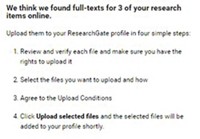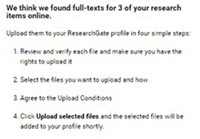Advertisement
Grab your lab coat. Let's get started
Welcome!
Welcome!
Create an account below to get 6 C&EN articles per month, receive newsletters and more - all free.
It seems this is your first time logging in online. Please enter the following information to continue.
As an ACS member you automatically get access to this site. All we need is few more details to create your reading experience.
Not you? Sign in with a different account.
Not you? Sign in with a different account.
ERROR 1
ERROR 1
ERROR 2
ERROR 2
ERROR 2
ERROR 2
ERROR 2
Password and Confirm password must match.
If you have an ACS member number, please enter it here so we can link this account to your membership. (optional)
ERROR 2
ACS values your privacy. By submitting your information, you are gaining access to C&EN and subscribing to our weekly newsletter. We use the information you provide to make your reading experience better, and we will never sell your data to third party members.
Publishing
Scientific journal publishers take different tacks against ResearchGate
One group settles with and another sues the scientific networking site
by Andrea Widener
April 20, 2018

Scientific publishers are taking divergent paths in their attempts to protect copyrighted research from being shared on the networking site ResearchGate.
On April 19, three publishers—Springer Nature, Cambridge University Press, and Thieme Medical Publishers—announced they signed a cooperative agreement with ResearchGate.
“It shows that cooperation on the sharing of publisher content can be found and demonstrates the commitment from all parties to ensuring researchers are able to access and share high-quality scholarly research responsibly,” the publishers said in announcing the agreement.
Under the plan, ResearchGate will make it easier for publishers to find content that was originally published in their journals. It will also respond to requests from publishers to remove copyrighted content, as required by law in some places, including the U.S. and Europe.. “ResearchGate does not expect an extensive amount of content to be reported by participating publishers,” the organization said in a press release.
Meanwhile, in Germany, a separate coalition of publishers—including the American Chemical Society and the publishing giant Elsevier—went to court to clarify ResearchGate’s role in protecting journals’ copyright. ACS also publishes C&EN.
The publishers’ group, called the Coalition for Responsible Sharing, sued in the fall of 2017 after attempts to negotiate with ResearchGate failed. “Unfortunately so far ResearchGate has rejected all collaborative efforts we have put forth from our side; we see no other option but to take this route,” Jim Milne, spokesperson for the coalition and ACS’s senior vice president for publishing, said in a press release about the case. “Our ultimate goal is to find a long-term, viable solution with ResearchGate.” A court in Germany, where ResearchGate is located, held the first public hearing on the matter on April 18.
The coalition wants ResearchGate to use a program it developed to automatically scan papers uploaded by authors. It would quickly tell authors whether the paper can be posted publicly or can only be shared privately among small groups of colleagues.
ResearchGate opposes using the program as an attack on academic freedom. In its press release about the Springer Nature agreement, the networking site specifically notes that agreement “does not allow [publishers] to preemptively block or filter research that scientists upload to the network.”




Join the conversation
Contact the reporter
Submit a Letter to the Editor for publication
Engage with us on Twitter